Understanding Domestic Birds: Their Meaning and Importance

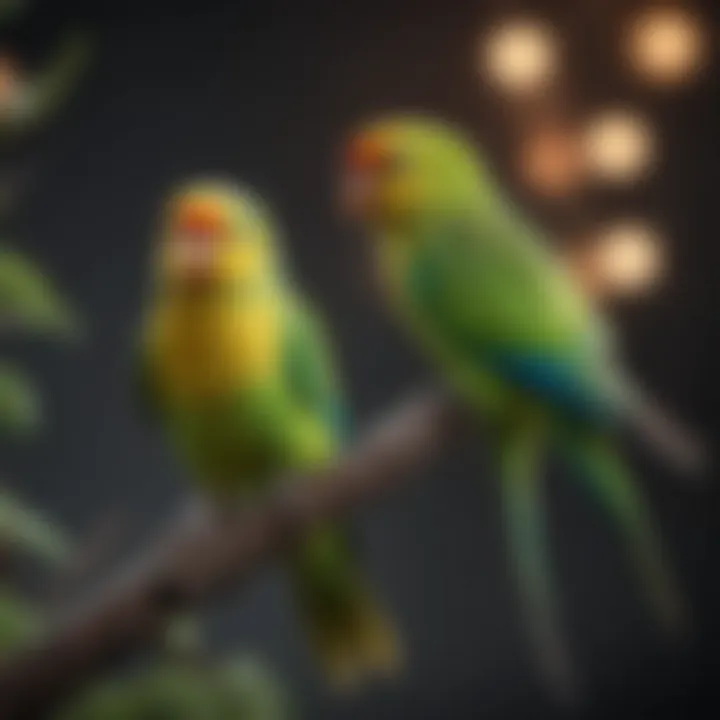
Intro
The presence of domestic birds in human lives is a subject of rich interest. Their meanings in Hindi reflect cultural nuances. Houses gain vitality with chirping, yet that goes beyond enjoyment. Knowledge about proper care, piecing together behavioral insights, nutrition guides, and wellness practices forms an essential understanding.
It’s not just about keeping a pet; it's about establishing a bond that enriches experience and environment. With that understanding in mind, we will explore these facets.
Care Tips
Caring for domestic birds involves daily attentiveness. Feeding routines are foundational and must be consistent. In addition to food, hydration should not be overlooked. Birds depend on us for their daily nourishment and health. Proper attention to their physical and emotional well-being eases our bond.
Daily Care Routines
Every day begins with a responsibility to check food and water bowls. The right type of food varies by species, and knowing those differences is crucial. Watching how much your bird eats can indicate health status. Interaction during feeding time develops trust and familiarity.
Cage Setup and Maintenance
Creating an engaging habitat involves more than just space. Vertical space should be maximized as birds thrive on height. Appropriate perches, toys, and hiding spots enrich their surroundings. Cleanliness is important; the cage must be maintained regularly. Filth can lead to health concerns.
Hygiene and Cleaning Practices
Your bird’s environment speaks volumes of their health. Daily spot-cleaning is paramount. Weekly cage cleaning should be a part of your routine. This includes replacing bedding and disinfecting surfaces where necessary. Safe cleaning agents must be used—avoid harsh chemicals that may harm the birds.
Seasonal Care Adjustments
Every season brings environmental changes. During colder months, pay attention to warmth. Ensure cages aren’t located in drafty areas. Summer may require modifications in terms of cooling. Birds also may require changes in bathing habits, adapting to humidity levels.
Behavioral Insights
To forge a deeper connection, observing and understanding bird behavior is key. Birds express emotion through body language similar to humans. Learning their signals can prevent misunderstandings. Understanding can foster a nurturing environment where your bird feels secure.
Understanding Bird Body Language
Body postures and movements can depict happiness, anxiety, or aggression. Puffed feathers might signal distress, while open wings suggest comfort in your presence. Recognizing cues helps facilitate a trusting relationship.
Common Behavioral Issues and Solutions
Sometimes, issues like excessive chirping or feather plucking can arise. Assess environment stimuli – too much can overwhelm birds and lead to distress. Techniques like providing more stimulation or managing stress effectively with gradual alterations can greatly aid.
Positive Reinforcement Techniques
Using encouragement rather than punishment aids in developing good habits. Reward during training builds behaviors you want. Small treats or praises could solidify trust. Consistency in your approach will yield better long-term results.
Social Interaction Needs
Fluffing their feathers and calls echo a longing for companionship. Birds thrive in social surroundings; thus, consider pairing or introducing new friends in different setups. Birds often mirror behaviors when they feel secure with humans.
Nutrition Guides
Pinpointing a consistent diet for your bird requires insight into what each species needs. A detailed approach equates to maximized health. This section delves into protein, vitamins, seeds blends, and more.
Essential Diet Components
Most pet birds benefit from seeds formulated specifically for them. Many birds also exneed fresh fruit and vegetables, offering vitamins critical to their health. Pellets can complement but should not replace seeds entirely.
Safe and Toxic Foods
Not all foods promote well-being. Seeds should be chemical-free and washed fruit ensured. Avoid avocados, chocolate, and dairy. Proper identification of toxic foods can safeguard against terrible health issues.
Supplements and Treats
Using safe nutrients compliments their diet. Calcium blocks help in maintaining bone strength. Treats should be limited—a handful once a week suffices to keep them healthy.
Feeding Strategies for Different Species
Diet should differ according to the unique bond of each species. Budgerigars and cockatiels differ substantially in needs. Knowing the distinction can lead to memorable relationships that thrive over time.
Wellness and Health
Monitoring well-being takes adherence to routines. Health takes precedence, executing easy steps to swiftly identify agreed-upon changes that might warrent veterinary care.
Routine Health Checkups
Annual checkups, even for seemingly healthy birds, guard against conditions. It’s wise to learn simple home checks to understand their overall state more clearly.
Identifying Symptoms of Illness
Signs like noticeable variations in chirping or changes in weight should alert hairs. Discharge from eyes or below normal bathing practices call for vet visits whenever possible, guarding every decision sumultaneously.
Preventative Care and Vaccinations
Prevention is as vital as treatment. Being up to date with vaccinations not only promotes individual health, yet ensures a safe neighborhood of animals.
Mental and Emotional Well-being
Just like their physical integrity, mental stimulation is paramount. Dururzng different activities, observing responsiveness helps confirm that they thrive individually.
Enriching Activities
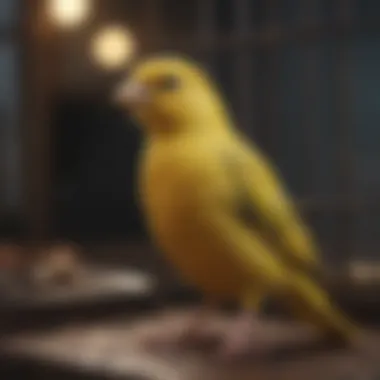
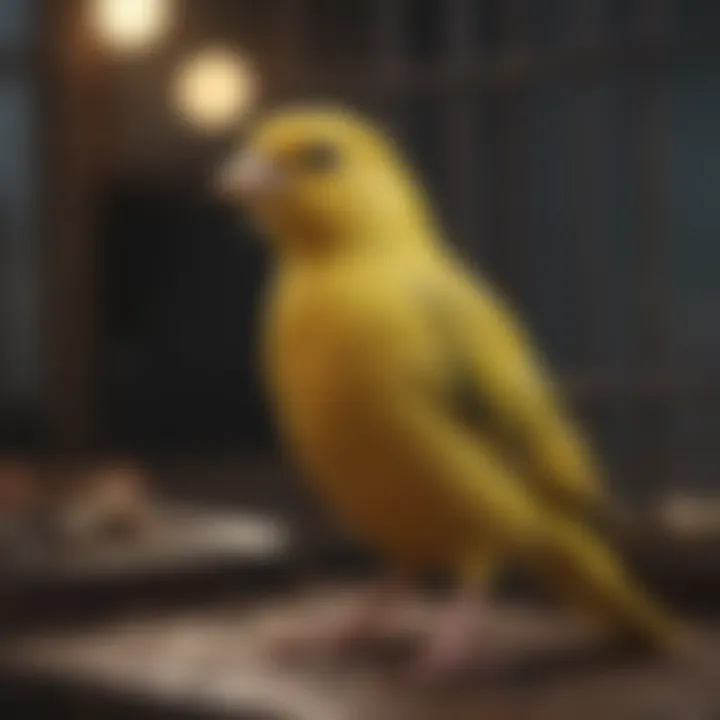
Every opportunity improves interaction. Play manifests links, establishing stronger threads while reinforcing creative thoughts and learning curves.
Toys and Playtime Ideas
Interactive toys prompt enthusiasm. Usual items-range from swings, spinning wheels, to chew-enhanced treats serve additional goals. Recognizing endearing attitudes can ensure positively engaging time slips past quickly.
Training and Tricks
Tricks leverage their mental peak abilities. Start simples—alloting time consistently establishes paths rarely imagined initially. Each pacubll stressed instead bolsters their honor of inventive activities infinitely attached.
Outdoor Activities and Interaction
Supervised trips to bird-friendly outdoors come with tremendous benefits. Connections to natural stimuli are transformative and will afford undistracted learning.
DIY Projects for Mental Stimulation
Home crafts, making foraging games, etc., elүкments warrant ample pursuit, keeping idle habits at bay. Compiling items from household waste can optimize pleasure returns at minimal costs.
In summary, comprehending the features and fostering domestic birds builds depth in living approaches significantly. Extend your knowledge and celebrate the distinctive value each bird contributes, beating cultural mundaneness.
Watch for updates and interactions that welcome both you and your bird as enriched companions rootedhely together in activities forever expansive.
Prelims to Domestic Birds
Domestic birds have long inhabited spaces alongside humans, providing companionship, utility, and amusement. The rich diversity of these birds across cultures indicates their importance not just as pets but also as integral members of many households. Understanding what domestic birds are and their impact on human society enhances both our appreciation and acknowledgment of our shared existence.
Definition and Classification
Domestic birds are a group of avian species that have been bred over generations for specific traits suited for human companionship or utility. Common examples include chickens, ducks, and parrots. They belong to various taxonomic categories based on their genetics, the purpose of breeding, and their environmental adaptability.
- Pet Birds: These are usually small birds, cherished for their beauty and ability to bond with humans. Species like budgerigars, canaries, and lovebirds offer companionship and minimal space requirements.
- Utility Birds: Such birds, like chickens and turkeys, are commonly bred for their eggs or meat. Their significance lies significantly in providing food security in households and contributing to agricultural sustainability.
Highly diverse classifications reflect how domestic birds fulfill numerous roles, each subset offering unique contributions to both individual owners and society. Different species embody different aspects of our culture and environment.
The Role of Domestic Birds in Human Society
The relationship between humans and domestic birds extends beyond mere companionship. These birds have been crucial in various domains:
- Agriculture: Birds like chickens and ducks provide necessary contributions to farming operations, such as pest control and natural fertilization through their droppings.
- Cultural Symbolism: In many societies, birds symbolize freedom, aspiration, and longevity. They often appear in artistic traditions, festivals, and myths reflecting various cultural values.
- Environmental Education: Owning domestic birds fosters awareness about wildlife, conservation, and proper care practices, which can lead to better environmental stewardship.
“Domestic birds collaborate with human goals while maintaining their own biological processes, making them an essential ecological link.”
The essential role of domestic birds in society emphasizes that they are more than just pets—they are partners in a shared journey, contributing both to cultural richness and ecological balance.
Meaning of Domestic Birds in Hindi
Domestic birds play a crucial role in various cultures. Understanding their meaning in Hindi reveals connections to traditions and practices within Indian society. This significance goes beyond mere words; it encapsulates cultural values and dynamics involving these avian companions. By analyzing various linguistic aspects, we can appreciate how domestic birds enrich human life
Translation and Linguistic Nuances
In Hindi, domestic birds are often referred to as पालतू पक्षी (palatu pakshi). The term captures the essence of birds that have been tamed or bred for companionship or utility in domestic settings. Each type of bird has its own name, such as कबूतर (kabootar) for pigeons or तोता (tota) for parrots. These terms indicate the relationship the people have with these creatures. For example, कबूतर tends to invoke thoughts about peace and harmony due to the bird's historical role in communication and representation in literature.
The nuance in language also reflects rural versus urban perceptions. In rural areas, birds often signify livelihood and reliance on poultry farming for food or economy. Meanwhile, urban settings may emphasize companionship and aesthetics. Hence, language around domestic birds adapts quite flexibelly and become a part of social discourse, symbolizing deeper meanings pertaining to lifestyle and aspirations.
Cultural Significance in India
The cultural significance of domestic birds in India cannot be overstated. Historically, birds such as chickens and ducks have held economic importance. They provide eggs and meat, contributing significantly to food security. दिया (diya), the household lamp, was historically lit with the hope of encouraging fertility and well-being in farms and households alike.
Moreover, birds play a part in festivals and rituals. During festive occasions, it is common for people to adopt birds for celebrations, introducing them into cultural narratives around family and community. Activities like flocking pigeons during ताजिया events (a tradition observed during the festival of Muharram) stimulate collective sharing of compassion.
Birdkeeping is viewing more as an art form. The mesmerizing sight of parakeets and budgerigars bring joy while also serving as a means for social prestige. Domestic birds then become a way for individuals to express identity or status within their communities.
In summary, both the translation of terms and their cultural impact illustrates rich meanings attached to domestic birds. More than just companions, these creatures are woven into the very fabric of Indian life.
Types of Domestic Birds
The area of Types of Domestic Birds is essential in understanding how various birds can fit into human life. This section offers insights into the broader spectrum of domestic birds, which are not only companions but also contribute seamlessly to our daily existence. Identifying the different types of birds and their unique characteristics aids people in making informed choices regarding pet ownership.
Different birds provide a range of benefits, such as companionship, beauty, and interactive personality traits. By recognizing the different types, potential owners can look at what fits their lifestyle and preferences best.
Common Pet Birds
Budgerigar
The Budgerigar, commonly known as the budgie, is a small parrot renowned for its vibrant colors and playful nature. This bird is popular due to its intelligence and ability to mimic sounds and human speech. Budgies usually reach lengths of about 7 inches, making them perfect for owners who may not have much space.
A standout characteristic is their social nature; they thrive in the company of humans and other birds.
Some advantages of Budgerigars include:
- Low maintenance
- Sociable behavior
- Good for beginners
On the downside, they can be a bit noisy, especially in a flock. Owners should also prepare for their lively and sometimes unpredictable behavior. Therefore, it is crucial to provide an engaging environment.
Canary
The Canary is widely admired for its melodic singing. Often regarded for their captivating vocals, canaries have a beautiful array of colors ranging from yellow to orange, and more. They make a stunning addition to homes due to their striking appearance and charm. These birds are usually around 5 to 6 inches in size.
A significant characteristic of canaries is their ability to sing not just any tune, but a variety developed through selective breeding over the years. This can bring joy to many households.
Several benefits of choosing a Canary include:
- Small size makes housing simple
- Minimal grooming needed
- Calming presence
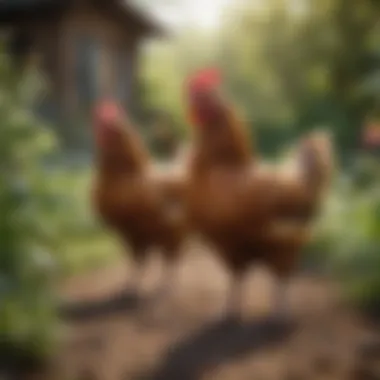
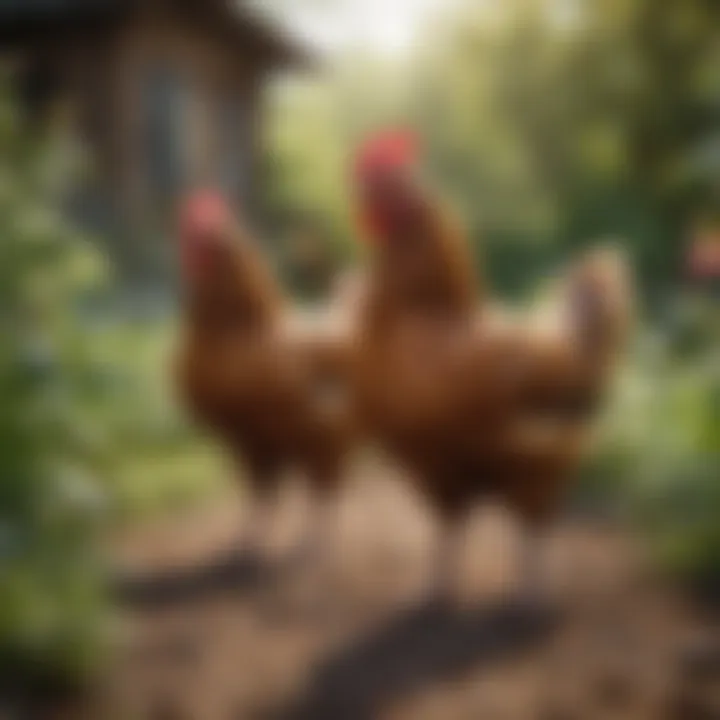
However, it is important to note that they can be solitary and may feel stressed if overcrowded with other birds. Owners should think about whether they prefer their company or a larger flock experience.
Lovebird
Lovebirds are small, engaging parrots known for the strong bond they form both with their owners and among themselves. Usually 5 to 7 inches long, these birds sport vibrant feathers which can range between many colors. Their affectionate nature and tendency to be social can be very rewarding for pet owners.
Lovebirds travel in pairs in the wild, which makes it advisable to keep them together to maintain their well-being.
Notable perks of Lovebirds include:
- Affectionate behavior towards owners
- Interactive playfulness
- Smart and engaging
Nonetheless, they can be demanding and require time spent regularly socializing. They can also exhibit jealous behavior if not handled properly with care.
Exotic Domestic Birds
Macaws
Macaws are large, colorful parrots celebrated for their startling beauty and big personalities. They can reach lengths of up to 40 inches, making them formidable companions. Macaws are remarkable mimics and boast an impressive variety of talking abilities. Their intellect offers unique engagements for owners.
Typical characteristics are their bright coloration and social nature, gaining them much attention and popularity among bird enthusiasts.
Important aspects of owning a Macaw:
- Require large cages
- Can form strong bonds with their owners
- Dual intelligence and fun experiences
However, they demand considerable attention and social interaction; neglect can lead to behavioral issues. Prospective owners should consider their commitment carefully.
Cockatoos
Cockatoos present a blend of quirky personality and potential for strong bonds with human caretakers. Medium in size — approximately 12 to 24 inches long — these birds are recognized for their crests and playful nature. The unique sociability of cockatoos makes them favorites for many bird lovers.
Notable traits include:
- Excellent companionship qualities
- Capable of showing emotions
- Multifaceted integration into family life
Nevertheless, this breed may scream or demand attention, which can be challenging in busy households. Therefore, potential owners may need to assess their liv (elihood).
Conures
Conures are small- to medium-sized parrots known for their amazing personalities and vibrant colors. The general size ranges from around 10 to 20 inches. Their sociability and friendliness attract various owners seeking interactive pet birds.
One of the most loved factors is their ability to form bonds with their human companions, leading to a delightful companionship experience.
Considerations for Conures include:
- Vibrant social nature
- Playful and entertaining behavior
- Encourage close bonding with humans
However, they can be noisy and require ample interaction. Ensuring a good environment with enough variety is key for their happiness and well-being.
Care and Nutrition for Domestic Birds
Caring for domestic birds involves a thoughtful approach to their health and nutritional needs. Proper care and nutrition are foundational to their well-being and longevity. This section delineates key aspects that aspiring bird owners must consider to provide a fulfilling environment for their feathered companions.
Essential Dietary Needs
Understanding the dietary needs of species varies among domestic birds. Each bird species has unique nutritional requirements designed to ensure growth, energy, and overall health.
A poor diet can lead to health problems such as feather plucking, obesity, and even life-threatening conditions. Thus, it is crucial to account for the following considerations:
- Seed Mixes: Many pet birds thrive on seed-based diets, but these can lack essential nutrients if not supplemented. Seek high-quality seed mixes designed specifically for your bird’s species.
- Pellets: A more balanced diet consists of pellets formulated to meet the complex needs of birdlike cockatiels or parrots. These can prevent selective eating, where birds might pick only their favorite seeds and neglect other crucial nutrients.
- Fresh Fruits and Vegetables: Fresh produce should be provided regularly. Leafy greens like spinach or kale, and fruits such as apples or berries can contribute vital vitamins.
- Calcium Sources: Especially important for females, offering cuttlebone or mineral blocks assures birds receive necessary calcium.
Ultimately, aiming for a varied diet enriches the lives of domestic birds and supports their long-term health.
Housing Requirements
Housing conditions play an integral role in the physiological and mental well-being of domestic birds. A proper enclosure provides safety and stimulates mental activity. To foster a healthy living space, consider these details:
- Cage Size: The bigger the better. Birds demand space to move freely, stretch their wings, and avoid stress-related issues.
- Cage Accessories: Incorporate perches, toys, and swings. Providing these enhances their physical activity. Rotating toys can keep their environment fresh and interesting.
- Sanitation and Cleanliness: Regular cleaning is mandatory to prevent diseases. Daily spot cleaning combined with thorough weekly cleanings reduces harmful bacteria.
- Safety from Hazards: Avoid placing the cage in direct sunlight or near exhaust vents which can cause temperature fluctuations. Adequate ventilation is also essential in maintaining a healthy habitat.
In establishing housing, these requirements signal not only attention to basic comforts of the bird but also a commitment to provide a stimulating home.
In summary, comprehensive knowledge about care, nutrition and housing needs fosters a deeper emotional bond between owners and their domestic birds.
Behavior and Socialization
Understanding the behavior and socialization of domestic birds is vital for any pet owner. It affects their health, well-being, and the overall bonding experience between the bird and its human caregivers. Avian behavior can be complex and multidimensional, reflecting a blend of instinctual drives and learned experiences. Communication is significant here; birds often chirp, squawk, or use body language to convey feelings. Analyzing these behaviors helps owners recognize when their birds feel happy or stressed. Providing the right environment enhances positive behaviors, leading to a happier bird.
Understanding Avian Behavior
Avian behavior incorporates several aspects of how birds interact with their environment. Factors include instinct, upbringing, and social context. It's essential to observe the natural instincts of birds, like their flight response or nesting habits. Different bird species possess distinctive behavior traits that inform their needs. For instance, budgerigars are social birds that thrive in companionship. Understanding these behaviors leads to better care decisions, ensuring that birds develop and grow in a conducive atmosphere.
Key Behaviors to Observe:
- Vocalizations: Birds use sounds for communication. Be attentive to the frequency and type of sounds.
- Body Language: Postures like fluffed feathers or wings held close may indicate how a bird feels.
- Playful Behavior: Birds enjoy stimulating activities, such as manipulating toys, which should be incorporated into their daily life.
- Social Pairing: Social connection with either humans or other birds can significantly impact their mood and behavior.
Social Interaction and Bonding
The socialization of domestic birds goes beyond their basic needs for care; it fosters emotional well-being. Proper social interaction enhances the bond between birds and their humans. Regular interaction reassures birds, helps make them feel secure, and encourages them to express their unique personalities. Formal training can also play a role in building a trustful and spcial bond.
Benefits of Socialization:
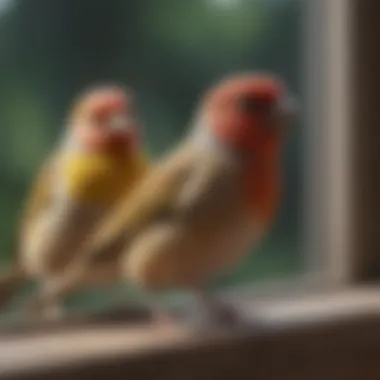
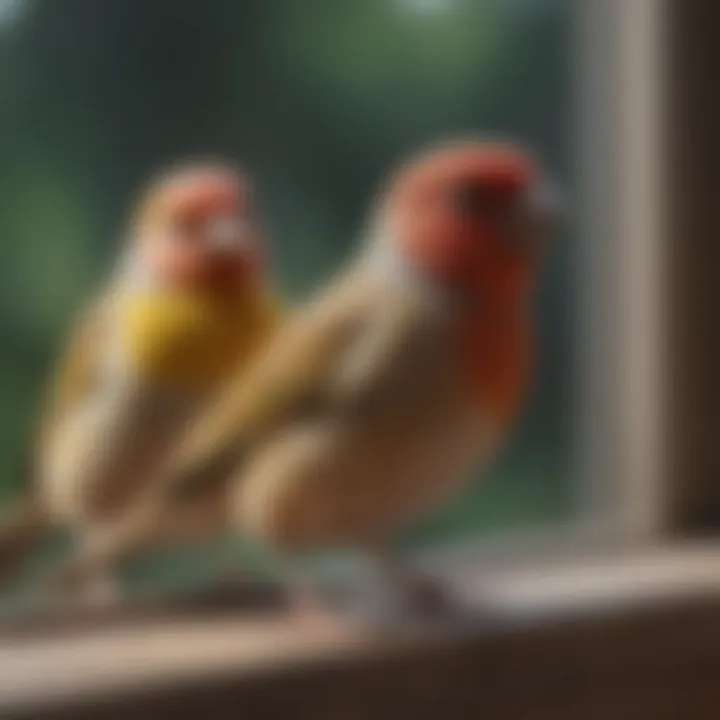
- Reduces Stress: Regular contact minimizes anxiety and fear in birds, as they feel less isolated.
- Increases Affection: Birds often learn to recognize their owners and form emotional attachments.
- Enhances Trust: Developing a social bond encourages cooperative behavior during health check-ups and other routines.
Through consistent interaction and mindful observation of behaviors, bird owners create a strong foundation for a meaningful relationship with their avian companions.
Improving methodical approaches will heighten the quality of the bird ownership experience while ensuring the well-being of these cherished pets. The combination of understanding avian behavior and facilitating socialization enables domestic birds to lead fulfilling lives, characterized by trust, health, and engagement.
Health and Wellness
Understanding the health and wellness of domestic birds is crucial for their longevity and quality of life. Maintaining a healthy environment is key to preventing diseases, enhancing lifespan, and improving the overall experience for both bird and owner. Birds can be quite fragile. They often conceal symptoms of illness until they become serious. Thus, preventative care and awareness play vital roles. As passionate pet owners, your dedication to this aspect greatly influences the well-being of your avian friends.
Common Health Issues
Domestic birds can suffer from various health issues. Understanding these common problems can help you be proactive. Below are some prevalent health concerns:
- Respiratory Problems: Common in birds due to poor ventilation or damp surroundings. Signs include wheezing or labored breathing.
- Obesity: Often seen in pet birds, particularly those who are not as active. Avoid overfeeding and encourage play.
- Feather Problems: Moulting issues or excessive plucking can be critical indicators of distress or nutritional deficiencies.
- Parasites: Internal or external parasites, like mites or worms, can severely affect health. Regular check-ups can help in early detection.
- Digestive Disorders: A diet lacking the needed nutrients can prompt gut problems, seen through changes in droppings.
It is essential for bird owners to consult with avian veterinarians when symptoms arise. Timely intervention can save many lives.
Preventive Care and Check-ups
Prevention is always better than cure. Regular veterinary check-ups can catch problems before they escalate. Here are essential areas of focus:
- Routine Avian Health Exams: Regular check-ups allow the vet to monitor overall health. A thorough examination might reveal issues not immediately visible.
- Vaccination: Keeping up with recommended vaccinations can prevent widespread diseases in birds.
- Dietary Supplements: Ensuring birds obtain all necessary vitamins and minerals helps their immune systems. Your avian vet can provide suggestions tailored to your bird's needs.
- Environmental Conditions: Address issues such as air quality, humidity levels, and proper cage size to provide a better quality of life.
- Behavioral Check-ups: Assessing your bird’s behavior can show if there’s something wrong. Birds that appear lethargic or are less vocal might need medical attention.
Health is not merely absence of disease—a healthy bird is active, interacting positively, and displaying normal feather quality.
Efforts in preventing health issues can enhance the life experience of your domestic birds. Advancing their wellbeing benefits both pet birds and their owners remarkably.
The Environmental Impact of Domestic Birds
Domestic birds are more than mere pets; they have demonstrable environmental effects that merit detailed exploration. Recognizing the ecological ripple effects produced by these avian companions is vital. Their mere presence at home can contribute towards reducing stress levels for humans and possibly enhancing one’s mood, although benefiting mental health does not directly measure ecological change. However, it’s not just about smiles and tranquility. Understanding this impact leads pet owners to acknowledge their responsibilities concerning avian housing and wellbeing efforts.
Benefits of Keeping Birds at Home
The advantages of maintaining domestic birds extend beyond companionship. They engage us in ways that other's pets may not. Here are some positive elements:
- Pest Control: Birds such as chickens are fundamentals in organic gardening by controlling pests and reducing harmful insects explosively. Their natural behaviors minimize the need for chemical pesticides.
- Waste Reduction: Certain domestic birds can consume leftovers that otherwise might end up in landfills. For instance, ducks, chickens, and turkeys savor kitchen scraps, aiding in effective waste management.
- Noise Reduction: One might not immediately think of birds contributing to a quieter environment, but domesticated birds appear to create a calming ambiance compared to many large pests. This can lead to decreased human noise levels overall, producing peaceful energy.
- Pollination: While not commonly associated with domestic varieties, some species do participate in garden improvement. Keeping birds around can bring a natural dynamic into your ecosystems, indirectly facilitating pollination through insect presence.
Overall, these friends engage us and merit serious consideration in how our actions influence neighborhood ecology.
Ethical Considerations
The question of ethics presents another layer regarding domestic birds and their environmental impact. Considerations range from how birds are acquired to what species are kept. Our choices ooze signals to broader ecologies and traditons. Here are several points to ponder:
- Habitat Preservation: A temptation exists to look for rare birds for one’s home, typically harvested unsustainably from the wild or imported.Before proceeding, it is crucial to evaluate the legality and environmental responsibility of this action. Keeping only native or breedable domestic species will help conserve biodiversity.
- Mass-Breeding Concerns: Many popular pet species stemming from mass-breeding operations suffer from genetic disease factors caused by selective breeding to meet pet demands. Buyers often overlook such these factors, resulting in failed investments.
- Care Requirements: Domestic birds require more than casual attention. Their needs involve diets, moral treatment, and adequate housing in line with both welfare codes and natural behaviors. Just as farms adhere to ethical standards, families have duties toward their avian cousins.
Keeping domestic birds isn't merely a commitment to companionship; it's a conscious effort towards their environmental footprint.
Acknowledging these ethical considerations enables responsible actions that encompass reducing overall impact and protecting community habitats. The choices made, whether regarding species, source, or care, hold immense significance for avian welfare and planetary health.
Connecting with the Bird Community
Engaging with the bird community can significantly enhance the experience of being a bird owner or enthusiast. By connecting with others who share similar interests, one can gain invaluable insights into the care, behavior, and health of domestic birds. A variety of platforms facilitate these connections, allowing for knowledge sharing, emotional support, and closer ties to the avian world.
Participating in this community provides access to wisdom that can ensure pets thrive in their home environments. Given the complexity of caring for different species, the advice found through interaction can prove vital for both novices and seasoned bird keepers.
Furthermore, being part of a community allows individuals to advocate for proper care and ethical considerations in birdkeeping practices. Engaging with others fosters responsibility, encourages sustainable habits, and heightens awareness of necessary resources.
Bird Clubs and Organizations
Bird clubs and organizations play an essential role in supporting bird owners and contributing to the overall well-being of domestic birds. These groups often host regular meetings, talks, and educational events that delve into various aspects of avian care. It also promotes knowledge sharing on relevant research and best practices.
Some key benefits of these clubs include:
- Education: Events often comprise seminars on health, nutrition, and behavior. Exposure to current standards and methods is crucial.
- Networking: Members have the opportunity to connect with experienced bird owners. Such relationships can lead to long-lasting friendships and valuable mentorship.
- Support: Challenges in bird ownership can arise, and having access to an empathetic group offers necessary support during difficult times.
- Advocacy: Clubs frequently engage in awareness programs, further interlinking communities and encouraging ethical ownership.
There are many notable organizations focused on domestic birds, like the American Bird Federation and the National Aviary. They provide excellent resources and foster a collective sense of responsibility toward avian well-being.
Online Resources for Bird Enthusiasts
In today’s digital age, online resources serve as a significant aspect of the bird-keeping community. Numerous websites and social media platforms allow enthusiasts to connect globally. These resources offer a plethora of information that serves various interests and needs.
Key resources include:
- Educational Websites: Websites like Wikipedia and Britannica provide detailed articles on species. They often discuss their habitats, behaviors, and care requirements.
- Forums: Platforms like Reddit have dedicated communities for bird owners to discuss various topics and share experiences.
- Social Media: Pages on Facebook enable users to engage with fellow enthusiasts, sharing photos and stories while discussing care.
Exploring these online resources brings immense value and offers numerous paths for personal growth and community involvement revisited through a remote lens.
Joining these platforms enhances knowledge about best practices and provides support to elevating standard care for domestic birds.
Ending
The conclusion of this article holds significant importance as it consolidates the insights gained throughout the discussion on domestic birds. These avian companions are more than just pets; they carry cultural meanings, provide emotional benefits, and serve practical roles in our daily lives. From an understanding of the term and its translations, to examining various types and their needs, the entire narrative works to build a deep appreciation for birds as integral members of our society.
Summary of Key Points
In order to reinforce the knowledge gathered, here is a brief summary of the main points discussed:
- Definition and Classification: Domestic birds are categorized based on various traits and can directly affect human culture.
- Cultural Significance in India: Understanding their role within Indian culture enhances their appreciation as companions.
- Types of Domestic Birds: A detailed look into common pet birds like Budgerigars and exotic birds such as Macaws reveals the diversity!
- Care and Nutrition: Essential requirements for birds highlight their complexity.
- Health and Wellness: Awareness of health issues fosters better ownership practices.
- Environmental and Ethical Aspects: The impact on the environment and the ethical considerations speak to the responsibilities of bird ownership.
- Community and Resources: Support networks, like local clubs and online communities, play a crucial role in bird ownership.
Encouragement for Future Bird Owners
For those considering bringing a domestic bird into your home, the journey offers unique rewards. Proper preparation can lead to a fulfilling relationship with these creatures. Start by researching specific dietary and housing needs that match the bird species you choose. Connect with other bird enthusiasts through clubs or online platforms like Reddit or Facebook, where sharing experiences will enrich your knowledge.
Moreover, adopting a bird comes with continuous learning. The more you invest in understanding your feathered friend, the more you will benefit from their presence. Be patient during their adjustment, and take time to observe their behavior. Each interaction encourages bonding and makes bird-keeping a deeply rewarding experience.















